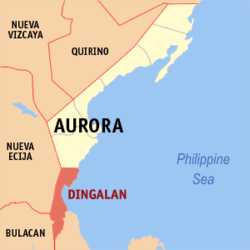Dingalan
| Dingalan | |
|---|---|
| Municipality | |
|
Poblacion | |
 Map of Aurora showing the location of Dingalan | |
.svg.png) Dingalan Location within the Philippines | |
| Coordinates: 15°23′N 121°24′E / 15.383°N 121.400°ECoordinates: 15°23′N 121°24′E / 15.383°N 121.400°E | |
| Country | Philippines |
| Region | Central Luzon (Region III) |
| Province | Aurora |
| District | Lone District |
| Founded | 1962 |
| Barangays | 11 |
| Government[1] | |
| • Mayor | Zenaida Q. Padiernos |
| Area[2] | |
| • Total | 304.55 km2 (117.59 sq mi) |
| Population (2010)[3] | |
| • Total | 23,554 |
| • Density | 77/km2 (200/sq mi) |
| Time zone | PST (UTC+8) |
| ZIP code | 3207 |
| Dialing code | 42 |
| Income class | 3rd class |
| Website |
www |
Dingalan is a third class municipality in the province of Aurora, Philippines. According to the 2010 census, it has a population of 23,554 people.[3]
Dingalan has several caves, of which the Lamao Caves are the best known. The rough shoreline and very high waves of Dingalan makes it attractive to surfers.
Geography
Dingalan is situated approximately 183 kilometres (114 mi) northeast of Manila. It is bounded on the north by San Luis (in Aurora province), on the west by Gabaldon and General Tinio (Nueva Ecija) and Doña Remedios Trinidad (Bulacan), on the south by General Nakar (Quezon), and on the east by the Benham Rise or Plateau and Pacific Ocean.
It is a small town with one main cemented road with branching alleys. Further south of the town proper are the barangays of Aplaya,butas na bato,Matawe, Ibona,dikapanikian and Umiray. The premier barangay north of the town is Paltic. All of the barangays are located on the seashore, except for poblacion and two barangay located in the mountains. The whole town is mountainous due to the Sierra Madre Mountains. The Umiray River separates the town from Quezon Province.
Barangays
Dingalan is politically subdivided into 11 barangays.[2]
- Aplaya
- Butas Na Bato
- Cabog (Matawe)
- Caragsacan
- Davildavilan
- Dikapanikian
- Ibona
- Paltic
- Poblacion
- Tanawan
- Umiray (Malamig)
History
Dingalan, formerly just a barrio, was created a municipal district within the municipality of Baler in 1956.[4] It was declared a town in 1962.
From November 30 to December 3, 2004, the town was wiped out by the tropical storms Violeta, Winnie, and Yoyong. The town benefited by relief efforts from foreign traders, some Christian groups, La Salle Greenhills, and the Philippine National Red Cross.
Demographics
| Population census of Dingalan | ||
|---|---|---|
| Year | Pop. | ±% p.a. |
| 1990 | 14,475 | — |
| 1995 | 19,325 | +5.56% |
| 2000 | 20,157 | +0.91% |
| 2007 | 21,992 | +1.21% |
| 2010 | 23,554 | +2.53% |
| Source: National Statistics Office[3] | ||
Images
-

Seat of Government, Town hall, Poblacion
-

Public Market, Poblacion
-
Dingalan Bay blue sea
-
The fisherfolks at Aplaya
References
- ↑ "Official City/Municipal 2013 Election Results". Intramuros, Manila, Philippines: Commission on Elections (COMELEC). 11 September 2013. Retrieved 23 October 2013.
- ↑ 2.0 2.1 "Province: AURORA". PSGC Interactive. Makati City, Philippines: National Statistical Coordination Board. Retrieved 23 October 2013.
- ↑ 3.0 3.1 3.2 "Total Population by Province, City, Municipality and Barangay: as of May 1, 2010". 2010 Census of Population and Housing. National Statistics Office. Retrieved 2012-10-22.
- ↑ "An Act Creating the Municipal District of Dingalan in the Municipality of Baler, Subprovince of Aurora, Province of Quezon". LawPH.com. Retrieved 2011-04-12.
External links
| Wikimedia Commons has media related to Dingalan, Aurora. |
 |
Gabaldon, Nueva Ecija | San Luis |  | |
| General Tinio, Nueva Ecija | |
Philippine Sea | ||
| ||||
| | ||||
| Doña Remedios Trinidad, Bulacan | General Nakar, Quezon |
| ||||||||||||||

